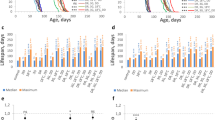Abstract
It is known that dietary restriction (DR) can significantly affect the lifespan (LS) of various model organisms, including Drosophila melanogaster. In some of our recent studies, it has been revealed that a reduction of the content of nutrients in larval medium may lead to an increase in the LS of insects. Analysis of these data suggested that a most likely candidate for such long-term adaptive changes is the epigenome of the insects (that is, persistent changes, induced by DR in the larval stage, in the activity of genes that are not related to changes in the DNA structure). To verify whether the observed effects are connected with longterm changes in the epigenetic regulation of genes associated with aging and longevity, in the present study we determined the expression level of InR and Sir2 genes, which are related to effects caused by DR. In the larvae that developed in DR conditions, a significant increase has been detected in the transcription level of both genes as compared with the control group. Adult males showed a significant increase in the expression level of gene InR, while no such changes were observed in females. The Sir2 gene expression level did not differ from the control level in adults of both sexes. It has been suggested that larval nutritional stress may lead to the induction of epigenetic adaptive rearrangements and can therefore extend the lifespan of the flies.
Similar content being viewed by others
References
Vaiserman, A.M., Zabuga, O.G., and Bazhinova, A.I., Influence of nutrition restriction at the different stages of ontogenesis on viability and longevity of Drosophila melanogaster, Probl. Stareniya Dolgoletiya, 2012, vol. 21, no. 4, pp. 462–469.
Vaiserman, A.M., Fedorenko, E.A., Koshel’, N.M., et al., Influence of diet in ontogenesis on longevity of Drosophila melanogaster, Probl. Stareniya Dolgoletiya, 2011, vol. 20, no. 4, pp. 361–370.
Zabuga, O.G., Koshel’, N.M., Kolyada, A.K., and Vaiserman, A.M., Influence of starvation in preconceptual period of parents on longevity of descendants of Drosophila melanogaster, Probl. Stareniya Dolgoletiya, 2012, vol. 21, no. 4, pp. 470–477.
Bartke, A., Mutation prolongs life in flies: implication for ageing in mammals, Trends Endocrinol. Metab., 2000, vol. 12, pp. 233–234.
Bauer, J., Antosh, M., Chang, C., et al., Comparative transcriptional profiling identifies takeout as a gene that regulates life span, Aging (N.Y.), 2010, vol. 2, no. 5, pp. 298–310.
Carsten, L.D., Watts, T., and Markow, T.A., Gene expression patterns accompanying a dietary shift in Drosophila melanogaster, Mol. Ecol., 2005, vol. 14, no. 10, pp. 3203–3208.
Cosentino, C. and Mostoslavsky, R., Metabolism, longevity and epigenetics, Cell Mol. Life Sci., 2013, vol. 70, no. 9, pp. 1525–1541.
Frankel, S., Ziafazeli, T., and Rogina, B., dSir2 and longevity in Drosophila, Exp. Gerontol., 2011, vol. 46, no. 5, pp. 391–396.
Hyun, S., Body size regulation and insulin-like growth factor signaling, Cell Mol. Life Sci., 2013, vol. 70, no. 13, pp. 2351–2365.
Lyko, F., Beisel, C., Marhold, J., and Paro, R., Epigenetic regulation in Drosophila, Curr. Top Microbiol. Immunol., 2006, vol. 310, pp. 23–44.
Mair, W., Goymer, P., Pletcher, S.D., and Partridge, L., Demography of dietary restriction and death in Drosophila, Science, 2003, vol. 301, pp. 1731–1733.
Parrella, E. and Longo, V.D., Insulin/IGF-I and related signaling pathways regulate aging in nondividing cells: from yeast to the mammalian brain, Sci. World J., 2010, vol. 10, pp. 161–177.
Partridge, L., Alic, N., Bjedov, I., et al., Ageing in Drosophila: the role of the insulin/IGF and TOR signaling network, Exp. Gerontol., 2011, vol. 46, pp. 376–381.
Piper, M. and Partridge, L., Dietary restriction in Drosophila: delayed aging or experimental artefact? PLoS Genet., 2007, vol. 3, p. e57.
Pletcher, S.D., Libert, S., and Skorupa, D., Flies and their golden apples: the effect of dietary restriction on Drosophila aging and age-dependent gene expression, Aging Res. Rev., 2005, vol. 4, no. 4, pp. 451–480.
Rogina, B. and Helfand, S.L., Sir2 mediates longevity in the fly through a pathway related to calorie restriction, Proc. Natl. Acad. Sci. U.S.A., 2004, vol. 101, no. 45, pp. 15998–16003.
Sinclair, D. and Verdin, E., The longevity of sirtuins, Cell Rep., 2012, vol. 2, no. 6, pp. 1473–1474.
Sookoian, S., Gianotti, T.F., Burgueño, A.L., and Pirola, C.J., Fetal metabolic programming and epigenetic modifications: a systems biology approach, Pediatr. Res., 2013, vol. 73, no. 4, part 2, pp. 531–542.
Tatar, M., The plate half-full: status of research on the mechanisms of dietary restriction in Drosophila melanogaster, Exp. Gerontol., 2011, vol. 46, no. 5, pp. 363–368.
Tatar, M., Kopelaman, A., Epstein, D., et al., A mutant Drosophila insulin receptor homolog that extends life span and impairs neuroendocrine function, Science, 2001, vol. 292, pp. 107–110.
Tu, M.-P. and Tatar, M., Juvenile diet restriction and the aging and reproduction of adult Drosophila melanogaster, Aging Cell, 2003, vol. 2, pp. 327–333.
Vickaryous, N. and Whitelaw, E., The role of the early embryonic environment on epigenotype and phenotype, Reprod. Fertil. Dev., 2005, vol. 17, pp. 335–340.
Wang, X.M., Early life programming and metabolic syndrome, World J. Pediatr., 2013, vol. 9, no. 1, pp. 5–8.
Author information
Authors and Affiliations
Corresponding author
Additional information
Original Russian Text © A.M. Vaiserman, A.K. Koliada, O.G. Zabuga, 2013, published in Uspekhi Gerontologii, 2013, Vol. 26, No. 4, pp. 638–642.
Rights and permissions
About this article
Cite this article
Vaiserman, A.M., Koliada, A.K. & Zabuga, O.G. Effect of dietary restriction during development on the level of expression of longevity-associated genes in Drosophila melanogaster . Adv Gerontol 4, 193–196 (2014). https://doi.org/10.1134/S2079057014030096
Published:
Issue Date:
DOI: https://doi.org/10.1134/S2079057014030096




